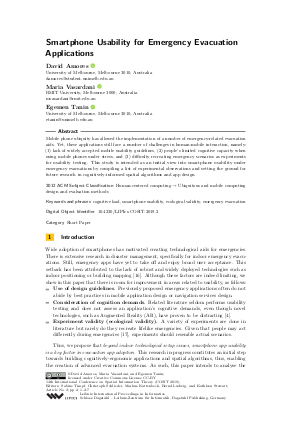Smartphone Usability for Emergency Evacuation Applications (Short Paper)
Authors
David Amores  ,
Maria Vasardani
,
Maria Vasardani  ,
Egemen Tanin
,
Egemen Tanin 
-
Part of:
Volume:
14th International Conference on Spatial Information Theory (COSIT 2019)
Part of: Series: Leibniz International Proceedings in Informatics (LIPIcs)
Part of: Conference: Conference on Spatial Information Theory (COSIT) - License:
 Creative Commons Attribution 3.0 Unported license
Creative Commons Attribution 3.0 Unported license
- Publication Date: 2019-09-03
File

PDF
LIPIcs.COSIT.2019.2.pdf
- Filesize: 0.94 MB
- 7 pages
Document Identifiers
Subject Classification
ACM Subject Classification
- Human-centered computing → Ubiquitous and mobile computing design and evaluation methods
Keywords
- cognitive load
- smartphone usability
- ecological validity
- emergency evacuation
Metrics
- Access Statistics
-
Total Accesses (updated on a weekly basis)
0PDF Downloads0Metadata Views
Abstract
Mobile phone ubiquity has allowed the implementation of a number of emergency-related evacuation aids. Yet, these applications still face a number of challenges in human-mobile interaction, namely: (1) lack of widely accepted mobile usability guidelines, (2) people’s limited cognitive capacity when using mobile phones under stress, and (3) difficulty recreating emergency scenarios as experiments for usability testing. This study is intended as an initial view into smartphone usability under emergency evacuations by compiling a list of experimental observations and setting the ground for future research in cognitively-informed spatial algorithms and app design.
Cite As Get BibTex
David Amores, Maria Vasardani, and Egemen Tanin. Smartphone Usability for Emergency Evacuation Applications (Short Paper). In 14th International Conference on Spatial Information Theory (COSIT 2019). Leibniz International Proceedings in Informatics (LIPIcs), Volume 142, pp. 2:1-2:7, Schloss Dagstuhl – Leibniz-Zentrum für Informatik (2019)
https://doi.org/10.4230/LIPIcs.COSIT.2019.2
BibTex
@InProceedings{amores_et_al:LIPIcs.COSIT.2019.2,
author = {Amores, David and Vasardani, Maria and Tanin, Egemen},
title = {{Smartphone Usability for Emergency Evacuation Applications}},
booktitle = {14th International Conference on Spatial Information Theory (COSIT 2019)},
pages = {2:1--2:7},
series = {Leibniz International Proceedings in Informatics (LIPIcs)},
ISBN = {978-3-95977-115-3},
ISSN = {1868-8969},
year = {2019},
volume = {142},
editor = {Timpf, Sabine and Schlieder, Christoph and Kattenbeck, Markus and Ludwig, Bernd and Stewart, Kathleen},
publisher = {Schloss Dagstuhl -- Leibniz-Zentrum f{\"u}r Informatik},
address = {Dagstuhl, Germany},
URL = {https://drops.dagstuhl.de/entities/document/10.4230/LIPIcs.COSIT.2019.2},
URN = {urn:nbn:de:0030-drops-110947},
doi = {10.4230/LIPIcs.COSIT.2019.2},
annote = {Keywords: cognitive load, smartphone usability, ecological validity, emergency evacuation}
}
Author Details
References
-
Junho Ahn and Richard Han. An indoor augmented-reality evacuation system for the Smartphone using personalized Pedometry. Human-Centric Computing and Information Sciences, 2(1):18, 2012.

-
David Amores, Maria Vasardani, and Egemen Tanin. Early Detection of Herding Behaviour during Emergency Evacuations. In 10th International Conference on Geographic Information Science (GIScience 2018). Schloss Dagstuhl-Leibniz-Zentrum fuer Informatik, 2018.

-
Umit Atila, Yasin Ortakci, Kasim Ozacar, Emrullah Demiral, and Ismail Karas. SmartEscape: A Mobile Smart Individual Fire Evacuation System Based on 3D Spatial Model. ISPRS International Journal of Geo-Information, 7(6):223, 2018.

-
John W Ayers, Eric C Leas, Mark Dredze, Jon-Patrick Allem, Jurek G Grabowski, and Linda Hill. Pokémon GO—a new distraction for drivers and pedestrians. JAMA internal medicine, 176(12):1865-1866, 2016.

-
Luca Chittaro and Daniele Nadalutti. Presenting evacuation instructions on mobile devices by means of location-aware 3D virtual environments. In Proceedings of the 10th international conference on Human computer interaction with mobile devices and services, pages 395-398. ACM, 2008.

-
Liou Chu and Shih-Jung Wu. An integrated building fire evacuation system with RFID and cloud computing. In Intelligent Information Hiding and Multimedia Signal Processing (IIH-MSP), 2011 Seventh International Conference on, pages 17-20. IEEE, 2011.

-
Arzu Çöltekin, Benedikt Heil, Simone Garlandini, and Sara Irina Fabrikant. Evaluating the effectiveness of interactive map interface designs: a case study integrating usability metrics with eye-movement analysis. Cartography and Geographic Information Science, 36(1):5-17, 2009.

-
Rachel Harrison, Derek Flood, and David Duce. Usability of mobile applications: literature review and rationale for a new usability model. Journal of Interaction Science, 1(1):1, 2013.

-
Yutaka Inoue, Akio Sashima, Takeshi Ikeda, and Koichi Kurumatani. Indoor emergency evacuation service on autonomous navigation system using mobile phone. In Universal Communication, 2008. ISUC'08. Second International Symposium on, pages 79-85. IEEE, 2008.

-
Suzanne Kieffer, Ugo Braga Sangiorgi, and Jean Vanderdonckt. ECOVAL: A Framework for Increasing the Ecological Validity in Usability Testing. In System Sciences (HICSS), 2015 48th Hawaii International Conference on, pages 452-461. IEEE, 2015.

-
Liisa Kuparinen, Johanna Silvennoinen, and Hannakaisa Isomäki. Introducing usability heuristics for mobile map applications. In Proceedings of the 26th International Cartographic Conference, August 25 30, 2013, Dresden, Germany, ISBN 978-1-907075-06-3. International Cartographic Association, 2013.

-
Alessandro Mulloni, Hartmut Seichter, and Dieter Schmalstieg. Handheld augmented reality indoor navigation with activity-based instructions. In Proceedings of the 13th international conference on human computer interaction with mobile devices and services, pages 211-220. ACM, 2011.

-
Jaziar Radianti, Jose J Gonzalez, and Ole-Christoffer Granmo. Publish-subscribe smartphone sensing platform for the acute phase of a disaster: A framework for emergency management support. In Pervasive Computing and Communications Workshops (PERCOM Workshops), 2014 IEEE International Conference on, pages 285-290. IEEE, 2014.

-
Maria Shitkova, Justus Holler, Tobias Heide, Nico Clever, and Jörg Becker. Towards Usability Guidelines for Mobile Websites and Applications. In Wirtschaftsinformatik, pages 1603-1617, 2015.

-
Ming-Kuan Tsai, Yung-Ching Lee, Chung-Hsin Lu, Mei-Hsin Chen, Tien-Yin Chou, and Nie-Jia Yau. Integrating geographical information and augmented reality techniques for mobile escape guidelines on nuclear accident sites. Journal of environmental radioactivity, 109:36-44, 2012.

-
Lauri Wirola, Tommi A Laine, and Jari Syrjärinne. Mass-market requirements for indoor positioning and indoor navigation. In Indoor Positioning and Indoor Navigation (IPIN), 2010 International Conference on, pages 1-7. IEEE, 2010.

-
Xiaolin Yang, Zhongliang Wu, and Yingchun Li. Difference between real-life escape panic and mimic exercises in simulated situation with implications to the statistical physics models of emergency evacuation: The 2008 Wenchuan earthquake. Physica A: Statistical Mechanics and its Applications, 390(12):2375-2380, 2011.

